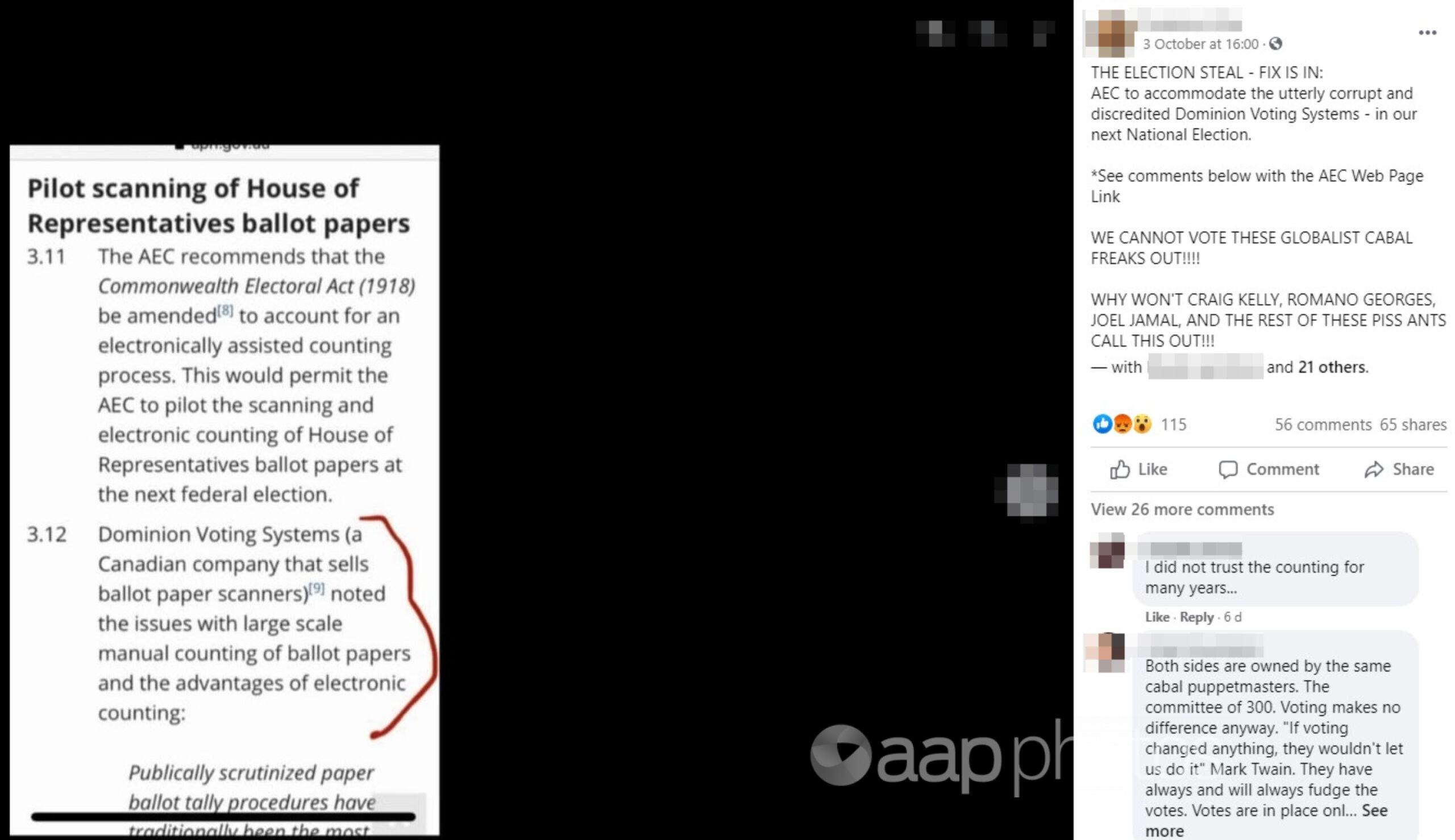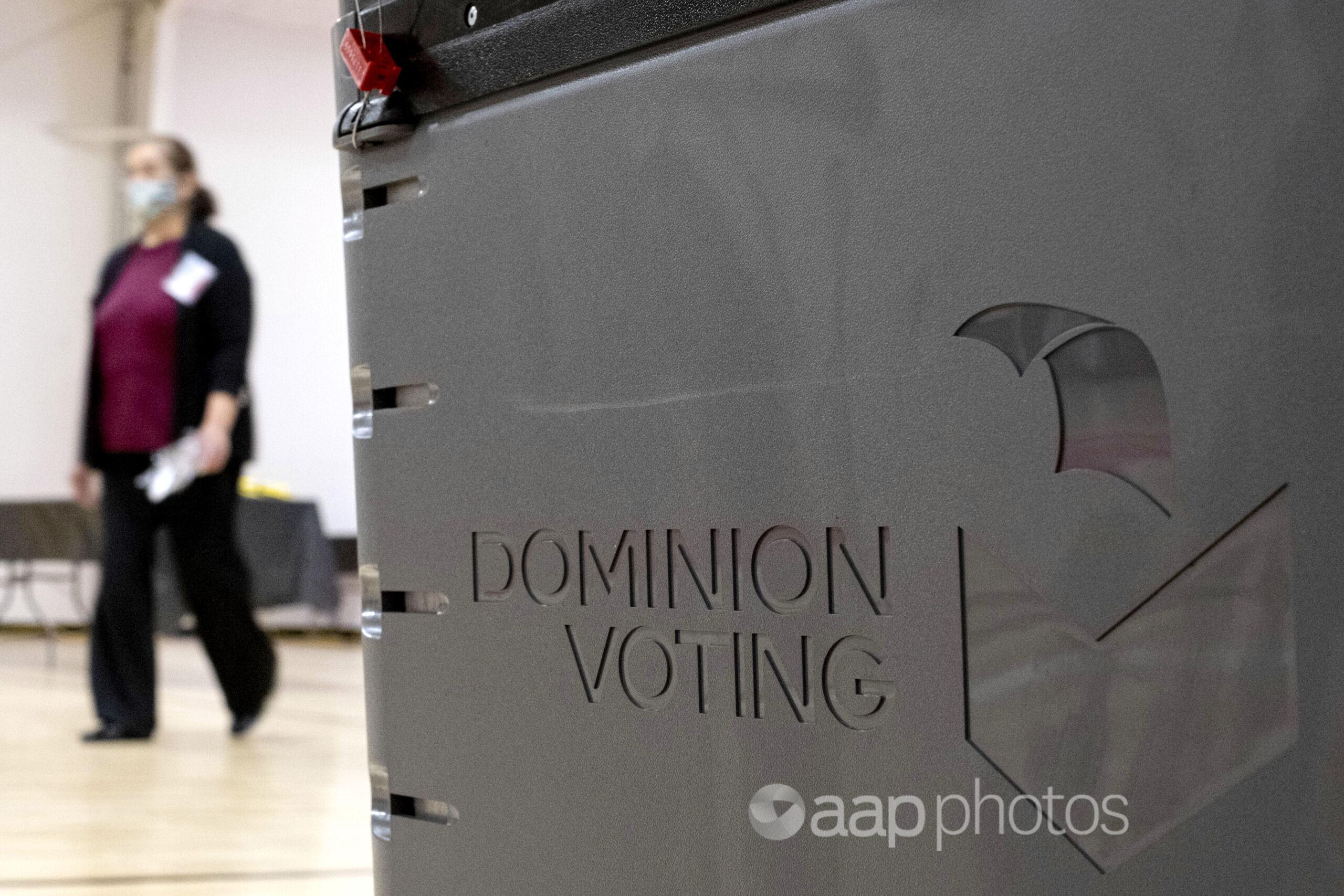The Statement
A social media post claims the Australian Electoral Commission (AEC) plans to use Dominion Voting Systems machines to count votes at the next federal election.
Dominion electronic voting machines came to prominence in the wake of the 2020 US presidential election and then president Donald Trump’s unfounded claims that the election had been stolen via the rigging of mail-in ballots.
A Facebook post extends the conspiracy to Australia, claiming: “The election steal – fix is in: AEC to accommodate the utterly corrupt and discredited Dominion Voting Systems – in our next National Election.”
The post includes a screenshot of a parliamentary report headed, “Pilot scanning of House of Representatives ballot papers” and the text of two successive points.
One is a recommendation by the AEC to amend the Commonwealth Electoral Act to allow for a pilot scheme to scan and electronically count House of Representatives ballot papers at the next federal election. The second is a reference to a submission by Dominion Voting Systems on the advantages of electronic counting.
The claim that the AEC proposes using Dominion voting machines, based on the same parliamentary report section, also features in a Facebook post and video from the Great Australian Party. The post says that the “AEC proposes to acquire Dominion Voting Systems’ machines”, which is described as “another attack on our democracy and the democratic vote”.

The Analysis
The Australian Electoral Commission (AEC) is not planning to use Dominion Voting Systems at the next federal election, the agency confirmed to AAP FactCheck. The post’s claim is a misrepresentation of a 2017 report on potential modernisation of the AEC following a parliamentary inquiry into the 2016 federal election.
The report itself was not written by the AEC; rather, it was produced by the Australian parliament’s Joint Standing Committee on Electoral Matters.
Section 3 of the report is titled “Australian Electoral Commission’s proposed reforms”, and points 3.11 to 3.15 focus on a proposed “pilot scanning of House of Representatives ballot papers”. However, the section does not say that the AEC is proposing to use Dominion voting machines.
Rather, the US-Canadian company was invited to make its own submission to the inquiry, which included five recommendations. The first of these was that “Australia adopt electronic ballot counting to improve the transparency, accuracy and speed of the electoral process”.
Apart from mentioning proposals from the AEC and Dominion in successive points, the report does not draw any link between the electoral commission’s suggestions and the voting machine company.
The AEC’s submissions to the committee make no mention of Dominion Voting Systems, nor do they call for the mass counting of votes using electronic systems. Instead, one submission suggests “some form of trial of electronic voting”, going on to state that the AEC “does not recommend a large scale trial of electronic voting for the next election”.
In an email, an AEC spokesman told AAP FactCheck that the claims in the posts were false, adding “the AEC and Dominion were merely mentioned in adjacent paragraphs of a report we didn’t write”.
“We’ve seen claims in a few online forums that it ‘proves’ the AEC is working or planning to work with Dominion, but that is simply incorrect,” he said.
The spokesman noted that Australian federal elections did not feature electronic voting or voting machines, the introduction of which would require “comprehensive change to electoral laws”.
The AEC has also addressed the claims on social media, such as in the comments of the Facebook post mentioned above.
“While we did suggest piloting scanning House ballot papers, the suggestion ultimately didn’t go anywhere and no pilot program has ever occurred – and we certainly didn’t suggest partnering with any company,” the commission said via its Facebook profile.
The AEC also addressed the claim on Twitter in response to a tweet from Great Australian Party leader Rod Culleton.
The AEC website outlines how the Australian voting system works for both the House of Representatives and for the Senate. Currently, the count is manual.
For its part, Dominion has addressed a mass of misinformation about its operations on its website. Dominion also sued Trump allies and other parties, including news organisations, who it says falsely accused the company of participating in election fraud via its voting systems.
They include Sidney Powell, a campaign lawyer for Mr Trump and a main contributor to the Dominion conspiracy theories. In her defence to Dominion’s defamation lawsuit, her lawyers argued that reasonable people would not accept her statements as fact but rather “claims that await testing by the courts”.
Dominion isn’t the only voting machine company to be targeted by conspiracy theorists. AAP FactCheck has previously debunked claims about the company Scytl’s involvement with electoral commissions in Victoria and Queensland.
AAP FactCheck has also fact-checked multiple false or misleading claims shared by the Great Australian Party or its candidates (see here, here, here, here and here).
The Verdict
The Australian Electoral Commission is not planning to use Dominion Voting Systems at the next federal election. That and related claims are based on a parliamentary report which merely mentions a submission by Dominion in a separate point to one detailing a pilot proposal for electronic vote counting by the AEC.
In its own submissions, the AEC did not call for mass electronic vote counting, nor did it mention the use of Dominion systems.
False – Content that has no basis in fact.
* AAP FactCheck is an accredited member of the International Fact-Checking Network. To keep up with our latest fact checks, follow us on Facebook, Twitter and Instagram.
All information, text and images included on the AAP Websites is for personal use only and may not be re-written, copied, re-sold or re-distributed, framed, linked, shared onto social media or otherwise used whether for compensation of any kind or not, unless you have the prior written permission of AAP. For more information, please refer to our standard terms and conditions.


















